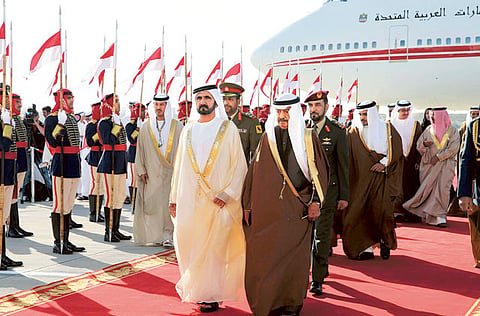Saudi Arabia calls on Iran to stop interfering
Minister says Iran using current ‘circumstances’ to interfere

Manama: Saudi Arabia on Monday told Iran to stop interfering in internal Gulf Arab affairs and spreading “sedition”, activities Tehran denies.
The comments, made by Saudi Foreign Minister Prince Saud Al Faisal, follow similar allegations levelled at Iran by the kingdom in the past, and other Gulf states are likely to voice similar complaints at a summit of the six-nation Gulf Cooperation Council (GCC) that opened on Monday.
“Interference to stir sedition is unacceptable from a neighbour,” Prince Saud was quoted as saying by the London-based, Saudi-owned daily Al Hayat.
“This is not comfortable because it is trying to use the circumstances to interfere.”
Prince Saud was speaking in Bahrain, which is hosting the annual summit of the leaders of the Saudi-led GCC, a group of oil-exporting Gulf Arab countries that comprises Saudi Arabia, Qatar, Kuwait, Bahrain, Oman and the UAE.
The newspaper did not elaborate on what the Saudi minister meant by “circumstances”, but the most common Gulf Arab complaint about alleged Iranian interference in the region relates to Bahrain, which has repeatedly accused Tehran of meddling in its internal politics.
While not convulsed by unrest on the scale of Egypt or Libya, Bahrain has been volatile since pro-democracy protests erupted last year.
Bahrain’s government brought in GCC forces last year to help quell the protests, and Iran condemned the move, saying it could lead to regional instability. Bahrain has accused Iran of being behind the unrest. Tehran denies this.
The two-day summit is also likely to hear fresh calls from Gulf Arab leaders for an end to the violence in Syria and for President Bashar Al Assad to step down.
The GCC in November recognised a newly-formed opposition coalition as the legitimate representative of the Syrian people.
In an interview on Bahrain television, GCC Secretary-General Abdulatif Al Zayani said the summit would debate several matters including the Syrian crisis, conflict in Yemen and “Iranian interference”.
Bahrain’s opposition complains it has long been marginalised in political and economic life, an assertion the government denies. The government has rejected the protesters’ main demand for an elected government.



